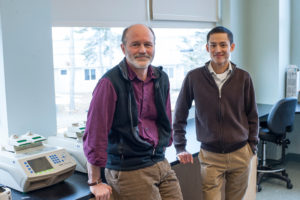A federal patent has been awarded to scientists from the MDI Biological Laboratory, a step that will allow research to proceed on a molecule that shows promise in helping heart tissue regenerate after a heart attack.
The nonprofit biomedical research institution based in Bar Harbor announced Tuesday that the U.S. Patent and Trademark Office will grant a patent to Kevin Strange, Voot P. Yin and Michael Zasloff for testing molecule MSI-1436’s effectiveness for treatment of damage to the heart.
Doctors Strange and Yin both work at MDI Biological Laboratory, and Zasloff is scientific director at MedStar Georgetown Transplant Institute at Georgetown University Hospital in Washington, D.C..
MDI Biological Laboratory said in a news release that the patent award represents a major step forward in moving the molecule MSI-1436 toward clinical trials in humans. It also is the first patent received by the laboratory.
“The importance of this achievement cannot be overstated,” Strange said in the statement. “This patent is a critical step forward in our ability to develop new treatments for those who suffer from heart disease.”
The actual research will be done by Strange and Yin’s for-profit company, Novo Biosciences, which has been granted an exclusive license by MDI Biological Laboratory to try to develop the molecule into a drug that can be safely used by humans, possibly in the form of a pill. There are currently no approved treatments to stimulate regeneration of heart muscle in humans.
“We are very excited, but I want to urge caution,” Strange said in an interview on Tuesday. Strange is also president of MDI Biological Laboratory. “It is going to be a long, tough process.”
Before human trials can begin, Strange and Yin must conduct trials on pigs. Strange said Novo Biosciences will have to raise $1 million to $1.5 million from investors and other sources to fund those trials.
Strange said it could take several years to develop a marketable drug, assuming it is found safe for human use and is approved by the U.S. Food and Drug Administration.
Strange and Yin said MSI-1436 has shown promise. Humans lack the ability to regenerate heart issue following a heart attack, which means that damaged areas are typically replaced with scar tissue. Scar tissue can interfere with the heart’s function and has the potential to lead to heart failure.
“Much of the current research in regenerative medicine focuses on highly complex stem cell therapies and tissue engineering strategies,” Strange said in a statement. “Our research demonstrates that repairing tissues may be as simple as taking a pill that activates our innate repair mechanisms.”
Strange said the potential market for a drug that stimulates tissue regeneration is huge. Heart disease accounts for approximately 17 million deaths per year worldwide, according to the World Health Organization.
Strange said the molecule holds promise because it has already proven to be “well tolerated” by patients involved in trials for obesity and type 2 diabetes in 2007. But although the preliminary research looks promising, Strange and Yin don’t want to raise expectations to an unrealistic level.
“We are just scientists. I don’t want to overhype this,” Strange said. “We still have a long way to go before we can try this on humans.”
Yin agrees, but said his research on zebrafish at MDI Biological Laboratory showed promise. Zebrafish share 70 percent of their genes with humans, but their ability to regenerate damaged tissue surpasses that of humans, Yin said..
“The zebrafish heart robustly regenerates missing or damaged tissue in as little as 30 to 60 days,” Yin said.
Yin, Strange and Zasloff introduced MSI-1436 into zebrafish and regeneration accelerated. The scientists believe the molecule could activate similar genes in humans.
Yin said that in mice, administration of MSI-1436 within 24 hours of an artificially induced heart attack greatly increased their chance of survival and tripled the generation of heart muscle cells. It also doubled the improvement of heart function and reduced the amount of scar tissue by 53 percent four weeks after the heart attack.
“If MSI-1436 shows similar results in humans, it will be a game-changer for patients who suffer a heart attack and/or are living with heart problems,” Yin said.
In addition to treating acute heart attack and muscular dystrophy, MSI-1436 also holds the potential to stimulate wound healing and reduce wound scarring, the scientists said.
Send questions/comments to the editors.




Success. Please wait for the page to reload. If the page does not reload within 5 seconds, please refresh the page.
Enter your email and password to access comments.
Hi, to comment on stories you must . This profile is in addition to your subscription and website login.
Already have a commenting profile? .
Invalid username/password.
Please check your email to confirm and complete your registration.
Only subscribers are eligible to post comments. Please subscribe or login first for digital access. Here’s why.
Use the form below to reset your password. When you've submitted your account email, we will send an email with a reset code.